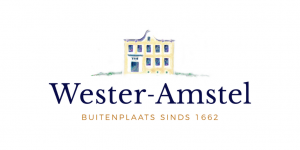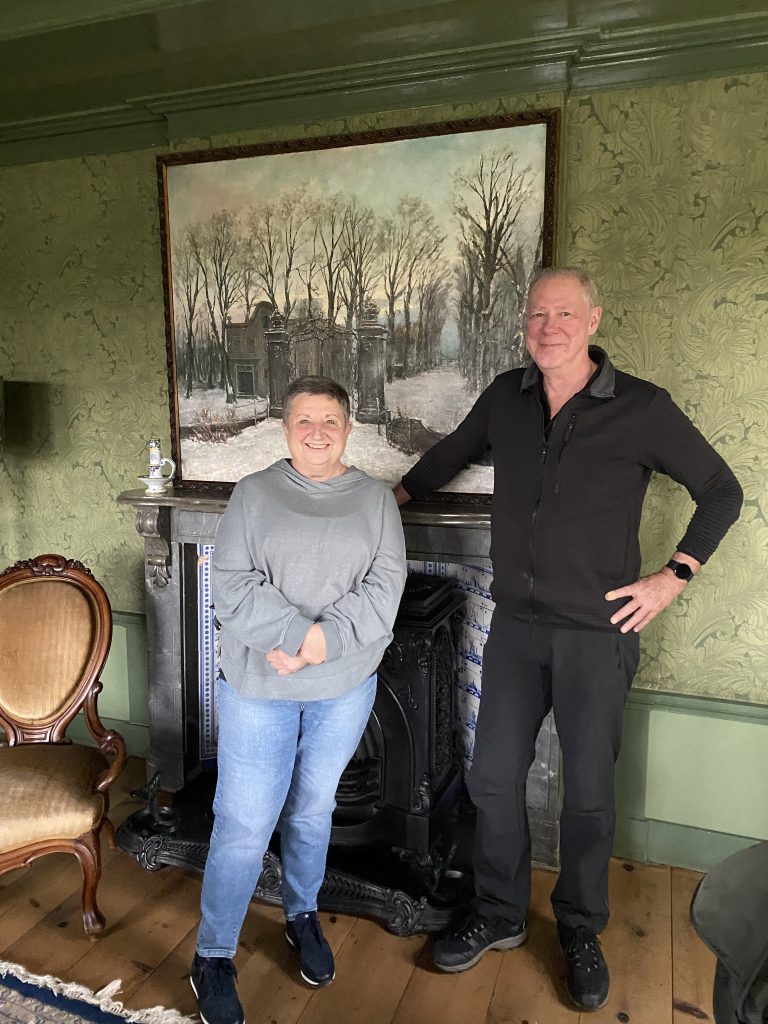In this edition of De Buitenplaats, we’re excited to introduce you to two of the Vrienden van Wester-Amstel Foundation’s board members: Frits Roest and Herma De Heer. Frits is the board’s newest member, having recently joined as the board’s trusted treasurer and logistics extraordinaire. Herma is a seasoned pro, having been part of Wester-Amstel since 2013, but she recently joined the board of our Friends foundation, and is now leading the charge as our events and stakeholder specialist.
Our interview took place in the front room of Wester-Amstel, which (I must admit) is an absolute show stopper. There’s nothing quite like doing an interview, while looking out over the Amstel River. Our conversation seemed to take inspiration from the scenery, flowing from topic to topic. Keep reading to find out more about Frits and Herma, what goes on behind the scenes at a Vrienden van Wester-Amstel Foundation board meeting, and what they hope the future holds for our beloved country estate.
Taylor Blades: Thank you both for taking the time to sit down for a chat. It’s a great opportunity for our friends to get to know two of the members on the Vrienden van Wester-Amstel Foundation’s board. Could you please introduce yourselves to our readers.
Herma De Heer: My name is Herma de Heer and I've been a part of the Arcadian Wester-Amstel Foundation’s board since… 2014 or 2015, so from the beginning. I met Wester-Amstel’s stewart years ago, during the Year of the Historic Country House. At the time, I was the manager of another country house - Castel Groeneveld. In my private life I’m a gardener and I work as a manager at the Ministry of Economic Affairs.
Taylor: And Frits, how about you?
Frits Roest: My name is Frits Roest. Where to start? A bit over twenty years ago, I moved to Amsterdam and since I was working and living in the Buitenveld (a neighbourhood in Amsterdam), I often cycled past Wester-Amstel. Eventually, I had the opportunity to look into Wester-Amstel in more detail.
We first started helping out in Wester-Amstel’s orchard, harvesting apples and pears. Then we found out that a certain plant grows at Wester-Amstel, but because it always finds its way into the Stinzentuin, the volunteers aren’t very fond of it. We, however, love this plant, so we asked if we could harvest it. They said yes. And so I come back every year to harvest this plant.
Then this spring, they asked if I would be interested in becoming the board’s treasurer. At that point in time, I had just finished up with another organisation. I had been the treasurer there for quite some time. So I said okay and I’m happy to do it.
[A brief discussion about how to cook this mysterious plant ensues… And a final conclusion is drawn: we really need a Wester-Amstel cookbook!]
Taylor: And Herma, what do you do on the board? What is your role?
Herma: That’s a difficult question. We all contribute to the board - in various ways. But mostly for me, I look at the public and I try to get a good idea of how we can increase our public role. For example, increase the number and bond with our friends or to bring back events. I look into planning special occasions and so on.
Taylor: And what kind of goals and/or aspirations do you have for the Friends of Wester-Amstel?
Herma: For next year, my goal is to get 100 more friends. That's quite a lot, I know. So we're discussing how to do it. Of course, you can do this by organising more events. We're planning in the coming months, for example, to host some readings here. But of course, there are other ideas like music, an event around all the good things that come from Wester-Amstel. So events that will make people enthusiastic about Wester-Amstel and that will help us get to know them better. I hope that, with these kinds of things, more people will join us as friends.
Taylor: I do believe we have around 300 friends right now.
Herma: Yes, somewhere around that.
Taylor: That would be great having 400 friends.
Frits: [jokes] Then we can buy golden shovels for the garden.
Herma: [laughs] It is a big number, but I think it's possible.
Taylor: Well that's exciting and I can't wait! It’s nice to have events here, so that people get to know Wester-Amstel better. Especially since we still get questions in regards to what we do here.
Herma: Certainly. We discovered that a lot of people who walk through our gates don't really know a lot about Wester-Amstel. And they don't know where to look, how to experience our gardens and park at their best, where to find the information, etc. So we're working on that.
Taylor: And so Frits, what is it like being the treasurer at Wester-Amstel? What is your role like?
Frits: Well, to be honest, it's not that much work. However, as treasurer, I do handle the administration duties for our friends. That's probably the most work - these administration tasks.
Herma: But is it so important!
Frits: Yes, it is important that the data is correct. You don't want to send newsletters to the wrong people, or things like that. I think that the average age of the Friends of Wester-Amstel is probably retirement age and above. So that's something of a challenge, especially to reach them. But luckily, people are becoming more digital savvy every year. So the number of friends who do not have an email address is vanishing and that makes it easier to reach them. The other challenge, as treasurer, is to get to know everyone and to make sure that processes are followed. For example, you want someone like Els to be in charge of everything that's spent on the garden and someone to be in charge of everything that's spent on the park. Because those are the people who know what’s necessary. It’s nice to get involved in what’s happening.
Taylor: Speaking on that topic… I must say that the Wester-Amstel community, especially its volunteers, are very close knit. It’s quite nice.
HermaIt is and they know each other very well. They've been working with each other... Really, for years and years... Every week!
Frits: I'm actually planning to be here at least one Saturday a month, so that people get to know me better. I think a lot of them know me by face, because when I'm here I always go into the garden and see who's there.
Taylor: How many people are on the board? And how often does the board meet?
Herma: There are... [points to the chairs around the table]. There are four people on the board and we meet once every two to three months.
Taylor: What kind of decisions does the board make? And what is its purpose? For the people who don’t know.
Frits: Well, there's always a couple of things that need to be decided. They can be very general. They can be anything from someone visiting to a new collaboration. For instance, the last time we had a proposal from... [turns to Herma]
Herma: Ah yes, Beschermers Amstelland.
Frits: So those are the things that you want to decide together.
Herma: We also discuss the finances, of course, within the board. Progress to make or maybe new plans, which you want to organise. Those kinds of things.
Frits: Everything is fine, as long as it doesn't cost too much.
Herma: That is maybe the ultimate challenge - organising things that are not very expensive, but have a lot of exposure. Because as you know... We're a healthy, but not a very wealthy organisation. So we have to learn to do things with what we have.
TaylorWhat do you enjoy about Wester-Amstel? Is there anything, in particular, that draws you to this place and that you enjoy?
Herma: It's a beautiful country house. It's the oldest along the Amstel, so it is a very important country house with lots of history and with a beautiful park that is worth maintaining, worth keeping alive. And if it's possible to be a part of that process... Well, that's a privilege.
Frits: I think they’ve done a great job in the past ten years restoring Wester-Amstel, especially the gardens, to its former glory. The line of sight and the garden, the vegetation. I've been around for the past 15 years and it has significantly improved. It's also a really great cycling distance from Amsterdam. This is one of the very few country houses that's publicly accessible. There aren't a lot of them left around Amsterdam, and so that's a great gift that’s actually accessible for people living in Amsterdam and Amstelveen.
Taylor: And what's your favourite thing about Wester-Amstel?
Frits: For me, it's probably everything you can eat. Prior to moving to Hilversum, we didn't have a garden. So if I come here and I get treated to something to eat, then I'm happy.
Herma: One of my favourite spots in Wester-Amstel is the stinzentuin. It's beautiful and, for me, it always marks the beginning of a new year, a new life... The sun is coming, the days are getting longer. So that's wonderful. And I know they're leaving for the winter, but the sheep. Josef and his women are so adorable. They're really a part of our family now.
Frits: I also really want to stress that both the park and garden groups are doing a lovely, lovely job. I've seen the work that the garden, for example, has been doing this year and sometimes I'm very jealous of how everything looks so great!
Herma: Oh Frits, have you also seen the roses? The rose garden here. It’s so beautiful. It's really fantastic what they've done. You really feel the love in every job that’s done here. They do it with so much... passion!
Taylor: One final question. In ten years time, where do you hope Wester-Amstel will be? What would you like to see in its future?
Frits: That's actually not that complicated to answer, because I think it would be wonderful if it stays as it is and is preserved very well. Because basically, most of the work that's done is preservation, attending to the gardens, growing vegetables, and seeing that everything is cleared up in the autumn and grows in the spring. Of course, yes, there are a few larger projects. But aside from some bigger projects, for the most part, it should stay the same as much as possible. No big changes. [laughs] Only if necessary.
Herma: I agree, partly... Because I hope that within ten years, there will be a new Orangery. And I really hope that the shed, that used to be at the back of the estate, is replaced by a nice little garden house. Or something like that... That would be wonderful.
By: Taylor Blades

